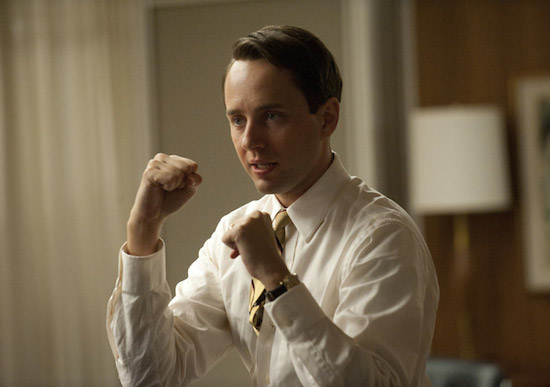Why do we sometimes (or often) act like such jerks?
Ok so maybe that’s quite a blunt way of asking ‘Why, while believing in what is good and right, do I choose to think in a way and engage in behaviour that accords with a “lesser version” of myself?’ I’ve asked this question for some time but I think it comes to the surface even more at the beginning of a new year when we are reminded from pulpits everywhere that we are a new creation in Christ and also by our broader world that this is a perfect time to set some New Year’s resolutions so that we can improve and be better people this year. We enthusiastically respond by nodding to the truth that in Christ we are a new creation and we agree that it is good to set some goals for the New Year, so we faithfully set out to practice these truths. But inevitably we sooner or later hit a wall when we experience that our ideals quite often fail to measure up to reality. Everyone has experienced this dissonance no matter how long we have been followers of Jesus. A godly and mature Christian friend when we were talking about this recently, said that he holds close to his heart values like generosity, care for the poor and compassion however as he walked past a homeless person once, he thought and felt the exact opposite of those values regarding that person. I can say that I’ve experienced a similar thing! I would guess that we all struggle daily as we sit in the uncomfortable gap between what ought to be and what in reality is. There’s no need to beat ourselves up about this gap but perhaps we need to think about what does in fact bring about deep transformation in our lives so that our behaviour more matches our status as new creations in Christ.
I was reading about the Anabaptist movement recently and a photo of an etching by Dutch artist Jan Luyken depicting an incident that happened to Dutch Anabaptist Dirk Willems in 1569 caught my imagination. Willems was being persecuted by the police as a practicing Anabaptist and the chase led him to cross a frozen lake. Willems made it across but the police officer chasing him did not and he fell into the lake. Willems looked back to see the struggling man and he turned back to help him out of the freezing water even though it would mean that he would be caught and arrested. That sort of stuff stays in my mind. What was it about Willems that he could at a difficult moment, instinctively practice the Christ commandment ‘Love your enemies’ in such a reflexive manner and at such great personal cost ?
What produces this kind of deep transformation so that behaviour lines up with belief?
In his book Virtue Reborn Tom Wright in the first chapter called ‘The moment when it counts’, which is on this issue of reflexively or automatically behaving in ways that are in line with our beliefs, says that Christians usually fall into two opposing practices when it comes to transformation. On the one hand Christians engage in an overly legalistic following of moral rules thinking that this will change their behaviour or on the other hand they practice the somewhat Romantic philosophy of ‘following their heart’ without any need for external guidance in transformation. I’ve seen Christians engaging in both and I’m sure you have too. We have all met the conscientious Christian who engages in all the right spiritual disciplines in a rules oriented manner which can negate grace and we have also all come across the Christian that says ‘It’s all just about believing in Jesus. Just believe and you’ll know what to do’. Wright argues that for true transformation we need to do both however without the Legalism and Romanticism. That is we need to engage in external practices which will transform us and we also need to follow our hearts which have been made new by the resurrected power of Jesus and are guided by the Holy Spirit’s presence.(1) My belief is that God’s Spirit transforms us and forms us into a missional people of God as we immerse ourselves in practices which are found in that already here and not yet fully manifest place called the Kingdom of God. James K.A. Smith writes about this in Desiring the Kingdom and says ‘We are embodied, affective creatures who are shaped and primed by material practices..that aim our hearts to certain ends, which in turn draw us to them in a way that transforms our actions by inscribing in us habits or dispositions to act in certain ways. In short, being human takes practice.’(2) So to give practical application to that thought by Smith, an example would be that if we habitually engage in the practices of consumerism we will be formed into consumers. Alternatively if we habitually engage in the practices of the kingdom of God we will be shaped into Christ followers.
Why does all this matter anyway?
At the beginning of this year a blog was going around about the fact that behavioural psychology tells us that it takes about 66 days to form a new habit.(3) It was shared widely I guess because everyone is thinking about New Year’s resolutions. As I reflected on that, I thought that the desire for transformation runs deep in each human being regardless of religion, race or status. However for Christians our transformation has a unique purpose. We work with the Holy Spirit for our transformation into the image of Jesus not primarily for our own affirmation, personal growth or self motivation. The love of God at work in us will always orient itself outward in order to be poured into the lives of others in our world. As God’s Spirit transforms us, we the missional people of God become an embodied apologetic for the gospel of good news. As Leslie Newbigin famously said the ‘church is the hermeneutic of the gospel’ and Darrell Guder who said that the church is a ‘parable’ of the kingdom(4), so our transformation therefore takes on a new urgency and direction.
So I return to my initial blunt question: ‘Why can I act like such a jerk sometimes?’ It’s true, I do act like a jerk sometimes. None of us can say that our behaviour consistently matches up with the ideal and it would be lacking in authenticity to pretend that it does. As I start the New Year however, my resolution is to keep practicing kingdom of God practices so that they become reflexive in me. Usually this will be costly and will make me feel uncomfortable. Sometimes I will be upset at my lack of progress. However other times I will marvel at the transformation that is occurring through the invisible work of that mysterious person, the Holy Spirit who changes me from one degree of glory to the next. Along with the apostle Paul I will ask ‘Who will save me from this body of death? Thanks be to God through Jesus Christ our Lord’ (Romans 7:24,25). And that is our real hope as God’s missional people who stand yet again at the beginning of another new year.
—
-
Tom Wright Virtue Reborn. London: SPCK, 2010 p24 (Published in USA as After You Believe: Why Christian Character Matters)
-
James KA Smith, Desiring the Kingdom. Michigan, Baker, 2009 p133
-
http://www.brainpickings.org/index.php/2014/01/02/how-long-it-takes-to-form-a-new-habit/
- Guder Darrell. Walking Worthily: Missional Leadership after Christendom: Lecture 1 (The Payton Lectures Fuller Theological seminary, May2-3, 2007)







Missio Alliance Comment Policy
The Missio Alliance Writing Collectives exist as a ministry of writing to resource theological practitioners for mission. From our Leading Voices to our regular Writing Team and those invited to publish with us as Community Voices, we are creating a space for thoughtful engagement of critical issues and questions facing the North American Church in God’s mission. This sort of thoughtful engagement is something that we seek to engender not only in our publishing, but in conversations that unfold as a result in the comment section of our articles.
Unfortunately, because of the relational distance introduced by online communication, “thoughtful engagement” and “comment sections” seldom go hand in hand. At the same time, censorship of comments by those who disagree with points made by authors, whose anger or limited perspective taints their words, or who simply feel the need to express their own opinion on a topic without any meaningful engagement with the article or comment in question can mask an important window into the true state of Christian discourse. As such, Missio Alliance sets forth the following suggestions for those who wish to engage in conversation around our writing:
1. Seek to understand the author’s intent.
If you disagree with something the an author said, consider framing your response as, “I hear you as saying _________. Am I understanding you correctly? If so, here’s why I disagree. _____________.
2. Seek to make your own voice heard.
We deeply desire and value the voice and perspective of our readers. However you may react to an article we publish or a fellow commenter, we encourage you to set forth that reaction is the most constructive way possible. Use your voice and perspective to move conversation forward rather than shut it down.
3. Share your story.
One of our favorite tenants is that “an enemy is someone whose story we haven’t heard.” Very often disagreements and rants are the result of people talking past rather than to one another. Everyone’s perspective is intimately bound up with their own stories – their contexts and experiences. We encourage you to couch your comments in whatever aspect of your own story might help others understand where you are coming from.
In view of those suggestions for shaping conversation on our site and in an effort to curate a hospitable space of open conversation, Missio Alliance may delete comments and/or ban users who show no regard for constructive engagement, especially those whose comments are easily construed as trolling, threatening, or abusive.